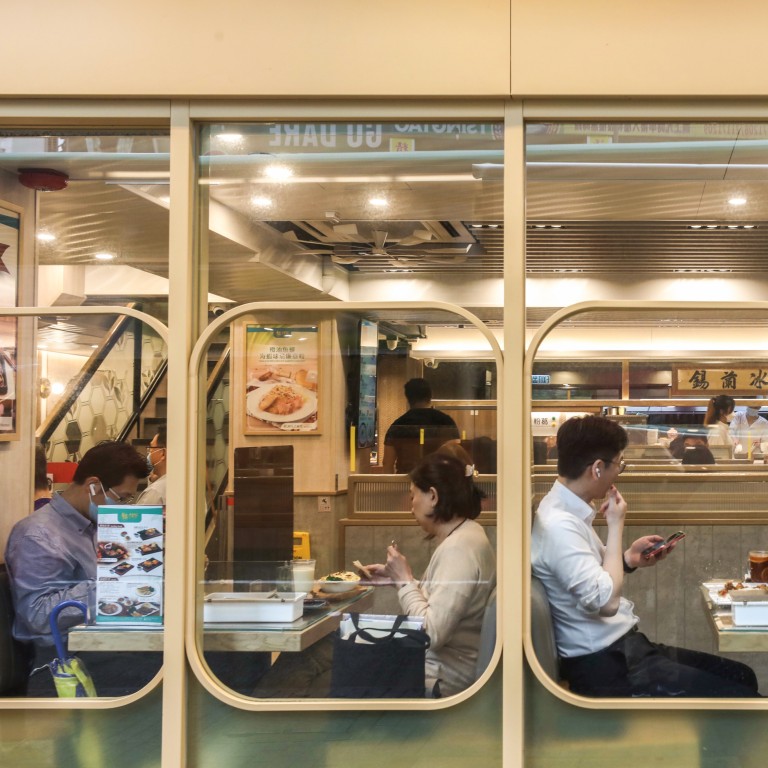
Coronavirus: Hong Kong restaurants fear revenues could fall 20 per cent under vaccine passport scheme
- Catering sector lawmaker warns of ‘earthquake-like’ impact on business revenue from tougher vaccination requirements for eateries and bars
- A vaccine passport scheme demanding at least two-thirds of diners in a restaurant to have minimum of one shot could launch in January
The Post has learned that the requirement for at least two-thirds of diners in a restaurant to have received a minimum of one vaccine shot could be introduced as early as next month.
What do we know about the new coronavirus variant, and should Hong Kong be worried?
The change would effectively extend the measure currently in force for 15 per cent of the city’s restaurants – those operating under the so-called Type D mode where a maximum of 12 diners per table is allowed – to all 16,000 of Hong Kong’s licensed eateries and bars.
Tommy Cheung Yu-yan, the legislator representing the catering sector who also sits on the Hong Kong leader’s cabinet, said he expected an “earthquake-like” impact on business revenue.
“There is no urgency for this measure. We are not having thousands of new cases like in some overseas countries. We only record a few imported Covid-19 cases every day,” Cheung said.
The Executive Council member said he feared turnover could plummet by as much as a fifth should the government press ahead with the vaccine passport scheme.

Cheung is seeking re-election in the catering functional constituency and is up against Rayman Chui Man-wai.
Hong Kong Federation of Restaurants and Related Trades president Simon Wong Ka-wo also doubted there was any urgency to introduce a vaccine passport scheme before the Lunar New Year holiday in early February.
“The government should allow more time for the sector to adapt to the extended use of the ‘Leave Home Safe’ app first,” Wong said, referring to a new measure requiring from Thursday the mandatory use of the risk-exposure app at various premises.
“The strong reaction from the sector is expected if the government pushes the vaccine passport too harshly or too fast. Perhaps when the vaccination rate has reached 80 per cent, there will be less resistance.”
But Wong was not as pessimistic as Cheung about business losses. “Business may be slightly hit,” Wong said. “But people need to eat after all. If they don’t dine in, they may buy takeaways.”
A number of unvaccinated Hongkongers the Post spoke to on Monday were still on the fence about getting inoculated amid worries about potential side effects.
A North Point clothing retailer, surnamed Kong, said the new measures would inconvenience him given that he dined out every day.
“I will think about it [vaccination] when the time comes. But the best scenario is that they do not implement these measures. I think it’s too strict. We should have the freedom to choose whether to get vaccinated,” the 62-year-old said.
Dried seafood shopkeeper Ming, 45, has no plans to get the jab any time soon, saying he lacked confidence in the vaccines.
“I usually buy takeaway food. If they don’t allow me to dine in, so be it,” he said.
A 55-year-old sundry shop owner in North Point said the new restrictions had gone too far.
“I feel frustrated. The policy is too much. Getting vaccinated should be voluntary, how can you force someone to do it?” said the vaccinated shop owner surnamed Chen.
Martin Chan, 64, of Wan Chai, who was also fully vaccinated, said he would try to persuade his mother, who is in her 80s, to take the jabs if the government pushed it.
“The whole world is doing this, and it is the only way through that we can fight against Covid-19,” he said.
Hong Kong set to require two-thirds of diners to have had Covid-19 jab
Meanwhile, family doctors said they were not worried that the new rules might lead to them coming under pressure to issue vaccination exemptions certificates.
Dr Edmund Lam Wing-ho said the profession would only issue such certificates if they were warranted, as he rejected the suggestion that doctor-patient relationships could be affected.
“Some of them were elderly people who had rejected vaccination previously,” Dr Lam said.
“But they now [agreed to be vaccinated] as more people around them had got vaccinated, and they also hoped to continue to go for yum cha,” he said, using the Cantonese phrase for getting together for dim sum.
Dr Cheng Chi-man said the vaccination exemption criteria currently recognised by the medical community covered only a small group of people, including cancer patients, those on heavy doses of steroids or people with a history of allergic reactions to vaccines.
The exemption certificate was also only valid for a certain period of time, he added.




